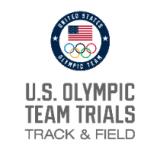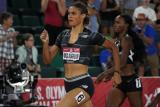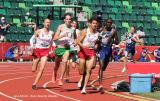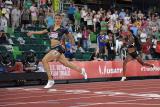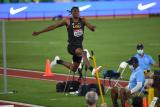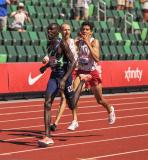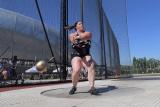Folders |
Cole Hocker Wins The 1,500, JuVaughn Harrison Doubles and Erriyon Knighton Chases Noah Lyles Onto The 200 TeamPublished by
Men's Day 10 Recap Youth Movement Continues For U.S. Men's Team As Harrison, Hocker and Knighton Make History By Doug Binder, DyeStat Editor A year ago, when the United States Olympic Team Trials were supposed to happen, Erriyon Knighton still had no idea what track and field held for him. Cole Hocker was a top prospect at Oregon, but a freshman without a season. JuVaughn Harrison might have been ready to contend for an Olympic team, but there was no guarantee. On Sunday night, all three waited a few extra hours before showing the world that they have arrived in 2021. A weekend heat wave scientists are calling a "once-in-a-millenium event" in the Northwest caused the conclusion of the 10-day U.S. Olympic Trials to be delayed four hours at Hayward Field. All that did was build anticipation for the final events to cap a remarkable meet that propped track and field upright again in the United States after 2020's cancellations and postponements. Harrison, 22, made history by winning the high jump with 7-7.75 (2.36m) before the delay, and taking the long jump with a personal-best 27-9.50 (8.47m) after it. That double comes after pulling off the same at the NCAA Division 1 Championships three times for LSU. He is ranked No. 2 in the world in both events and is the first American to qualify for the Olympics in those two very different jumping events since the legendary Jim Thorpe in 1912. (Thorpe competed in the decathlon, pentathlon, high jump and long jump). To put Harrison's achievement into perspective, 2016 Olympian and Sunday's second-place long jumper, Marquis Dendy, conjured an animated cartoon series called Avatar: The Last Airbender. "It's one of my favorite little anime cartoon-type of things," Dendy said. "There's a segment in there that talks about how rare it is to be a Metal-Bender, right? And there are even rarer people, who are Lava-Benders. "JuVaughn Harrison is a Lava-Bender." Hocker made history by sorting himself out of traffic in the final 200 meters and flying past reigining Olympic champion Matthew Centrowitz to win the 1,500 meters in 3:35.28. Hocker, who turned 20 earlier this month, has raced 10 times at the new Hayward Field since April and won seven of the races -- including the NCAA Championships and U.S. Olympic Trials. Hocker ran his first sub-four mile less than two weeks before the pandemic struck. Coming out of it, he has quickly become a world-class runner. "I might've been shocked if last year you would've told me that I won the 1,500 (at Trials)," Hocker said. "Throughout the season I have been proving to myself I can run and belong here." No one is a bigger fan than Centrowitz, who gave him a playful staredown and smile during the semifinals on Friday. "Super impressed (with Hocker's kick)," said Centrowitz, who was content with second place on Sunday and a return trip the Olympics. "I'm impressed with everything. I'm impressed that he's been able to do that since January and is showing no signs of letting up. I think it's just his personality. He steps on the line and doesn't care if he's racing a world record holder or a dual meet against a teammate, he's going to give it a great effort. I'm just impressed with everything." The men's 1,500 got tactical in the early going, which prevented Hocker from securing the Olympic standard (3:35.00). But with his victory and his credentials, he is expected to be invited to compete at Tokyo. He'll be the youngest American to make the 1,500-meter team since Marty Liquori did it as a 19-year old in 1968. While Centrowitz stayed in or near the front, Hocker was calmly staying near the back, and was in ninth place through 800. Hocker outkicked the field over the final 300, moving from fifth to first. "I felt very confident that I could win, and I came close to it, but I knew if someone would beat me it would be Cole," Centrowitz said. Notre Dame's Yared Nuguse outran Nike's Craig Engels, a pre-meet favorite to make the top three, for the final spot in 3:36.19. Engels could possibly make it if for some reason Hocker isn't chosen. In the 200 final, Knighton continued to amaze and took third place with 19.84, lowering his own World Under-20 record. He became the youngest male on the U.S. Olympic team since Jim Ryun 57 years ago. Noah Lyles, who was in Knighton's shoes five years ago and matured into a world champion by 2019, was on top of his game with a winning time of 19.74, a world-leading performance. Nike pro Kenny Bednarek, just three years out of Rice Lake High School in Wisconsin, ran a lifetime best 19.78 for second. The 200 final was an important moment for Lyles, who struggled earlier in the year to get into sync. The word he channeled was "flow." "I noticed every time I was aggressive I started tensing up … if I let it go and let it flow … and get into that Noah Lyles mode, I won’t have to press for it," he said. "I told my coach I think I entered into a new state of mind." If Lyles is on a higher plane than Knighton, it isn't by much. Not any more. Knighton discovered he was really fast less than a year ago when he ran 10.29 in the 100 and 20.33 in th 200 at the AAU Junior Olympics -- one of the few big youth meets that got off the ground last summer. By January, he had done enough to impress adidas and he signed a professional contract. Six months later, he is smashing age-group records held by Usain Bolt. "I’m so proud of him," Lyles said of Knighton, a fellow adidas athlete. "After I won I looked up at the screen and I was hoping his name would pop up after Kenny’s. To watch him PR in each round I was thinking, 'Don’t gas out, don’t gas out.' (When he made it) I was like, 'Bruh, you did it, you did what I couldn’t do (in 2016)' He did it. I’m just so happy for him." More news |
